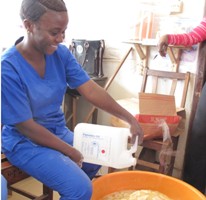You are here
Sierra Leone News: For post-ebola… Japan donates $2.2 m to WFP
Primary tabs

The United Nations World Food Programme (WFP) recently welcome a US$ 2.2 million contribution from the Government and the people of Japan that will enable WFP to support 77,000 people affected by the Ebola outbreak so that they can recover and receive the food and nutrition assistance they need.
“This significant contribution comes at a time when the people of Sierra Leone need support to recover from the widespread effects of the Ebola outbreak that swept through Sierra Leone in 2014 and 2015. Japan’s partnership with WFP will enable us to continue supporting the government’s Ebola recovery efforts to improve food security and nutrition across the country,” said Peter Scott-Bowden, WFP Country Director in Sierra Leone.
The donation will go towards purchasing cereals, pulses, and fortified nutritious foods for smallholder farmers, acutely malnourished children and pregnant and nursing mothers, and other vulnerable groups. It will enable WFP to provide food-for-work opportunities that will result in improved livelihoods for vulnerable communities, such as production of more and better quality rice, and increased access to markets by improving road conditions.
WFP will also provide food assistance to youth as an incentive for their participation in Technical and Vocational Education and Training activities (such as tailoring, carpentry, weaving) that will help build a more productive workforce and enhance social protection.
In line with the National Ebola Recovery Strategy that prioritizes restored access to maternal and child healthcare, WFP will be able to provide 40,000 moderately malnourished children and mothers with nutritional support. In addition, WFP will roll out a pilot stunting prevention programme, distributing specialised nutritious food to children under two years old in the Tonkolili district one of the districts with the highest rate of stunting, at 41.2 percent.
The preliminary results of WFP’s 2015 Comprehensive Food Security & Vulnerability Analysis (CFSVA) indicated that almost half of the population doesn’t have enough food to eat, with some districts recording up to 70 percent of the population food-insecure. The agricultural sector which is the primary source of income for more than half of the population was the hardest hit due to movement restrictions and bans on group labour which interrupted planting and harvesting cycles.
WFP in Sierra Leone leads the fight against hunger and builds long-term food security through vital food assistance programmes. As one of the frontline agencies in the Ebola response, WFP has an essential role to play in helping people recover and transition back to normality.
Thursday March 31, 2016
follow on:http://awoko.org/2016/03/31/sierra-leone-news-for-post-ebola-japan-donates-2-2-m-to-wfp/



Recent Comments